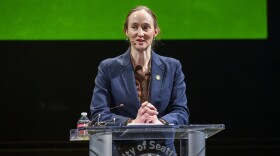Voters in Shelton are facing a big question this election: Should the city completely change its form of government?
This community on the Olympic Peninsula is the last city in Washington state led by a three-member commission.
A proposition on the ballot in the Nov. 7 election would expand the local government to a seven-member City Council.
To those who support the idea, it's a question of how to best represent an evolving community.
Logging trucks still roll through downtown Shelton from time to time. But this city, now home to 10,000 people, has changed since the heyday of the timber trade.
Residents say young professionals from Olympia are moving in, attracted by cheaper housing. Officials are trying to build up an economy based on tourism and the outdoors.
Meanwhile, this small town is confronting issues like opioid addiction and homelessness that were once viewed as big-city problems.
Shelton Commissioner Tracy Moore supports the change to a City Council. She said it's time to bring more voices into city government, even if it means diluting her own power.
“Myself and the other two commissioners all live in the downtown Shelton area," she said. "We’re all within the same decade and we all live in historic houses. And you know, that’s too much the same. We have outlying neighborhoods and areas that aren’t being adequately represented.”
Not everyone agrees. Shelton Mayor Gary Cronce, another member of the three-member commission, said the city government is running fine in its current form.
He also views the City Council proposition as a power play. He said a larger council would give an advantage to a political faction that's not in power right now.
“You know, they want their will done," Cronce said. "So they basically said, ‘Let’s go to a seven-person council so we can kind of put ourselves back in this commission that we kind of just lost elections on.'"
Supporters of a larger council say that all depends on who gets voted into office.
Moore said the three-member commission is a relic from days when small-town commissioners served as both the executive and legislative branches of government.
Commissioners used to directly oversee the city's public safety, public works, and finance departments while also voting on legislation.
But Shelton has had a city manager running the city's executive functions for more than 30 years, Moore said, making the commission little more than a scaled-down City Council.
Plus, there are practical considerations. The state's open-meetings law prevents any two commissioners from talking about city business outside of a public meeting because, in a three-member body, two people are a quorum.
That can lead to awkward encounters.
"We're in a small town," Moore said. "It's difficult to not bump into the other commissioners. You know, you just say, 'Oh hello, nice weather.' We're prohibited from talking about any city business or any decisions that we might make."
With a seven-member council, she said, members could work together on committees to tackle specific issues.
But Cronce said that change would strip city residents of a basic freedom: to choose their mayor. When voters elected Cronce, they chose him to be both mayor and commissioner of public safety.
If the proposition passes, council members would choose one of their own to serve as mayor once Cronce's term ends in 2019. The system would look similar to other council-manager governments, like those of Tacoma and Puyallup.
"I don't like the idea that the people can't vote for a mayor," Cronce said.
If Shelton residents decide they want a City Council, a special election could be held in February to fill the four new seats.
Cronce and the third commissioner, Kathy McDowell, would retain their seats and serve on the council until their terms end in 2019.
Moore is running for reelection this year. Whoever wins that seat is guaranteed to sit on the council as well.







